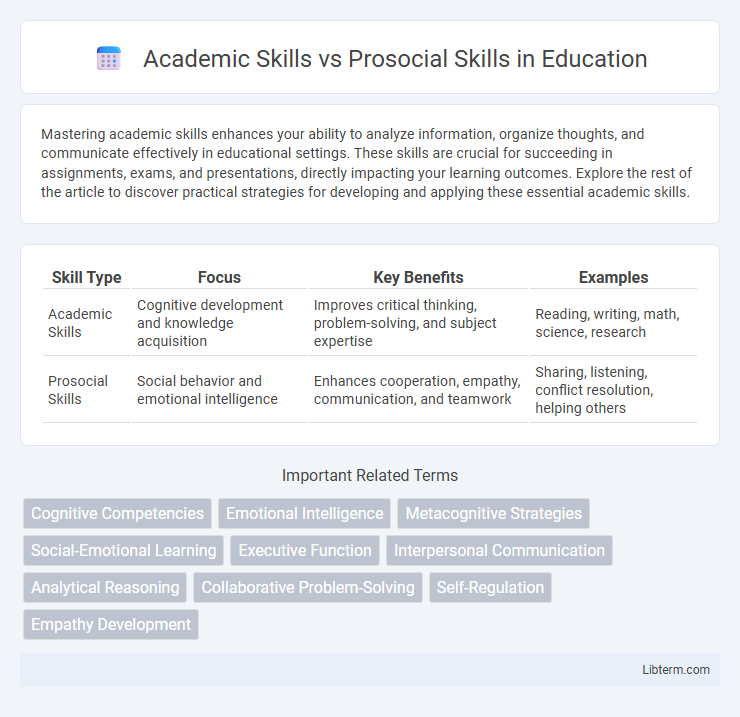Mastering academic skills enhances your ability to analyze information, organize thoughts, and communicate effectively in educational settings. These skills are crucial for succeeding in assignments, exams, and presentations, directly impacting your learning outcomes. Explore the rest of the article to discover practical strategies for developing and applying these essential academic skills.
Table of Comparison
| Skill Type | Focus | Key Benefits | Examples |
|---|---|---|---|
| Academic Skills | Cognitive development and knowledge acquisition | Improves critical thinking, problem-solving, and subject expertise | Reading, writing, math, science, research |
| Prosocial Skills | Social behavior and emotional intelligence | Enhances cooperation, empathy, communication, and teamwork | Sharing, listening, conflict resolution, helping others |
Defining Academic Skills and Prosocial Skills
Academic skills encompass reading, writing, mathematics, and critical thinking abilities essential for educational success and cognitive development. Prosocial skills involve empathy, cooperation, communication, and conflict resolution, crucial for positive social interactions and emotional intelligence. Both skill sets contribute to holistic development by supporting intellectual growth and fostering healthy interpersonal relationships.
Core Components of Academic Skills
Core components of academic skills include literacy, numeracy, critical thinking, and problem-solving abilities essential for effective learning and knowledge acquisition. These skills involve reading comprehension, mathematical reasoning, and cognitive processes that enable students to absorb and apply information across subjects. Mastery of academic skills supports academic achievement and fosters lifelong learning and intellectual development.
Key Elements of Prosocial Skills
Prosocial skills encompass empathy, cooperation, communication, and conflict resolution, which foster positive social interactions and emotional intelligence. These skills enhance teamwork and relationship-building, crucial for effective collaboration in academic and real-world settings. Developing prosocial skills supports emotional regulation and social responsibility, complementing academic abilities for holistic student success.
Importance of Academic Skills in Education
Academic skills, encompassing literacy, numeracy, and critical thinking, form the foundation for cognitive development and lifelong learning. Mastery of these skills enables students to comprehend complex concepts, engage in problem-solving, and achieve academic success across disciplines. Schools prioritizing academic skill acquisition foster higher educational attainment, improved career opportunities, and enhanced socio-economic outcomes for students.
The Role of Prosocial Skills in Student Development
Prosocial skills such as empathy, cooperation, and effective communication enhance student development by fostering positive peer relationships and creating supportive learning environments. These interpersonal abilities contribute to improved academic performance, emotional regulation, and conflict resolution, which are essential for holistic growth. Schools that integrate prosocial skill development alongside academic instruction promote resilience and social competence, preparing students for both academic success and societal engagement.
Academic Skills vs Prosocial Skills: What’s the Difference?
Academic skills involve cognitive abilities such as reading, writing, mathematics, and critical thinking essential for effective learning and academic achievement. Prosocial skills encompass social behaviors like empathy, cooperation, communication, and conflict resolution that facilitate positive interactions and relationships. Understanding the difference highlights that academic skills focus on intellectual development, while prosocial skills emphasize social and emotional growth.
How Academic and Prosocial Skills Influence Success
Academic skills such as critical thinking, problem-solving, and subject-specific knowledge build a foundation for intellectual achievement and career advancement, while prosocial skills including empathy, cooperation, and effective communication enhance teamwork and social adaptability. Success in educational and professional settings is significantly influenced by the integration of both skill sets, as academic competence alone does not guarantee effective collaboration or leadership. Research shows that individuals demonstrating strong prosocial behaviors alongside academic proficiency are more likely to achieve long-term success and positive interpersonal relationships.
Balancing Academic and Prosocial Skills in Schools
Balancing academic skills and prosocial skills in schools enhances student development by promoting both cognitive achievement and social-emotional learning. Integrating collaborative projects and communication exercises within the curriculum fosters teamwork, empathy, and conflict resolution alongside critical thinking and problem-solving skills. Research indicates that students who develop prosocial behaviors such as cooperation and empathy demonstrate improved academic performance and positive peer relationships.
Strategies to Foster Both Academic and Prosocial Skills
Effective strategies to foster both academic and prosocial skills include integrating collaborative learning activities that promote teamwork and communication while enhancing subject mastery. Implementing social-emotional learning (SEL) programs alongside curriculum instruction helps students develop empathy, self-regulation, and problem-solving abilities essential for academic success. Consistent teacher feedback, peer mentoring, and community engagement projects create environments where academic achievement and prosocial behaviors are mutually reinforced.
Future Implications: Preparing Students for Life
Developing academic skills equips students with critical thinking, problem-solving, and subject-specific knowledge essential for higher education and competitive job markets. Prosocial skills foster emotional intelligence, collaboration, and ethical decision-making, which are crucial for building positive relationships and effective teamwork in diverse work environments. Integrating both skill sets prepares students to navigate complex social and professional landscapes, ensuring long-term personal fulfillment and career success.
Academic Skills Infographic

 libterm.com
libterm.com